It is a fact that the South Indian combination of sambar-rice is one of the most comforting meals that can ever be. And why wouldn’t it be? It is a close relative of the quintessential ‘dal-rice or dal-chawal’ combo that is famous world over. So, here’s the Udupi Sambar recipe – a personal favorite from the world of sambars. This Udupi Sambar is spiced, slightly sweet, tangy, and made with pigeon pea lentils, tamarind, spices, herbs and mixed veggies.
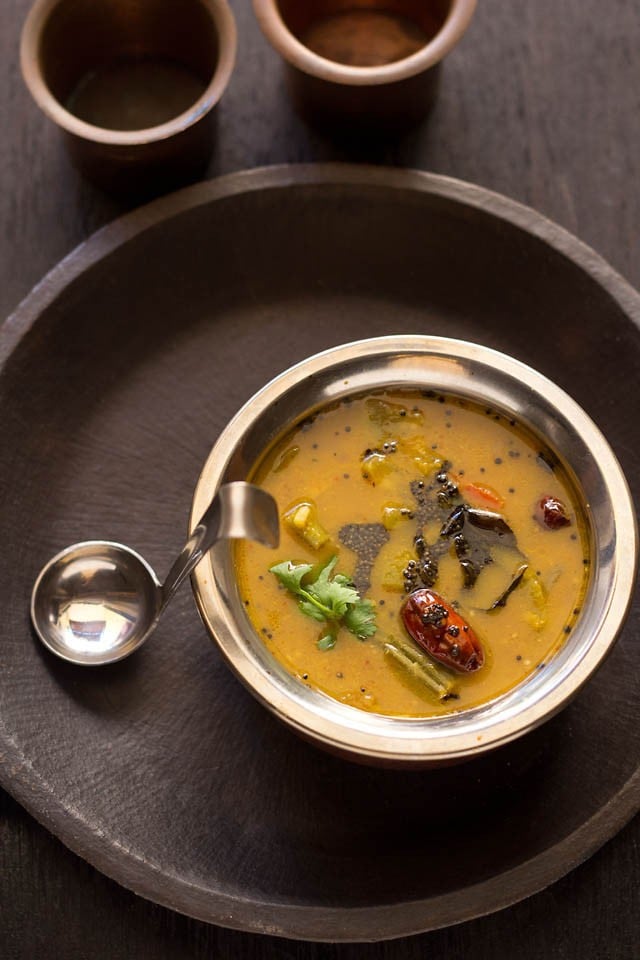
Table of Contents
More on this Udupi Sambar
If you ask me, the freshly ground Udupi Sambar Powder is the USP of this dish. The choicest of spices, chana dal (Bengal gram) and dried red chilies are roasted first and then ground to a lovely fragrant paste with coconut and water. When you add this to the sambar, it’s nothing less than magic!
The vegetables that I have added in this Udupi Sambar are carrot, drumsticks, brinjal (aubergine) and bottle gourd (lauki). You can use any other veggie that usually goes well in a sambar. Adding these only improves the nutrition quotient of the sambar and makes it filling too.
Generally, Udupi cuisine does not use any onion or garlic as well. However, I have used some pearl onions (sambar onions) in this Udupi Sambar. You can completely skip these.
This Udupi Sambar recipe is easy to make and can be served with steamed rice, Idli, Dosa or a Mysore Masala Dosa.
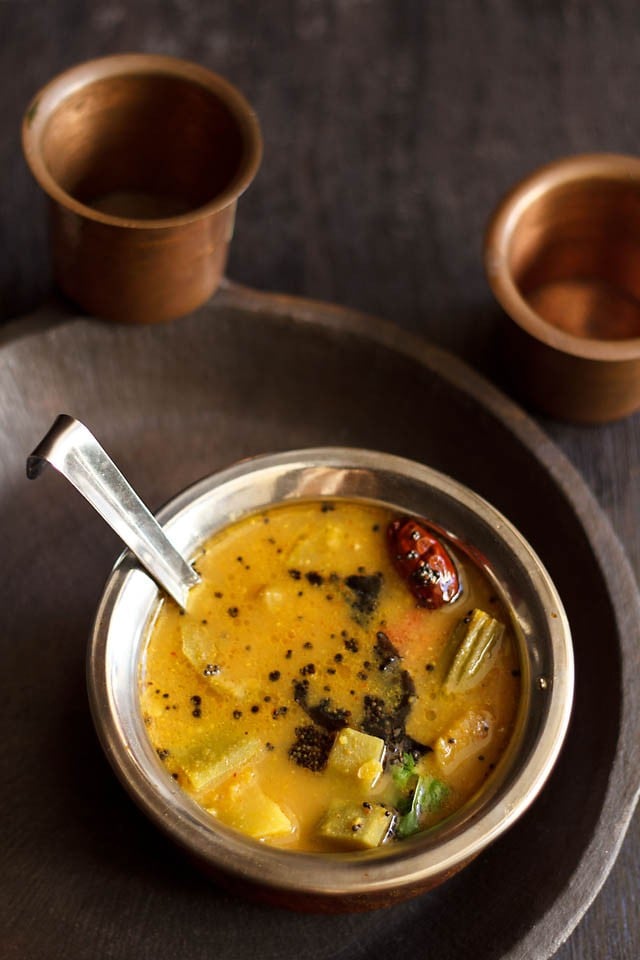
Udupi Sambar and Me
I’d developed a love-hate relationship with the Udupi Sambar since the first time I tried it at some restaurants in Bangalore (now Bengaluru), Karnataka and Mumbai in Maharashtra. Initially, I never understood the subtle sweetness in this sambar, and disliked it.
While growing up, the sambars that I had at home were never really sweet. Eventually, with the passing of years, I did develop a taste for this ‘sweetness’ in the Udupi Sambar. Today, I absolutely relish this particular flavor profile not only in sambar, but also in dals and kadhis.
Unlike the Kerala Sambar, this Udupi Sambar has a mild sweetness from the jaggery, some sourness from the tamarind, little spiciness from the chilies and a touch of earthiness from the coconut. It is aromatic and very fulfilling. I would call it an ‘all-rounder!’
How to make Udupi Sambar
Make Udupi Sambar Masala
1. Keep all the ingredients required for making sambar powder ready.
Note: As a reader had suggested in the comments, you can also add 1 teaspoon fennel seeds.
- 3 teaspoons coriander seeds
- 2 teaspoons urad dal (husked and split black gram)
- 1 teaspoon cumin seeds
- 3 to 4 dried red chilies (broken and seeds removed)
- 1 teaspoon chana dal (husked and split Bengal gram)
- ¼ teaspoon fenugreek seeds (methi dana)
- ⅛ teaspoon asafoetida (hing)
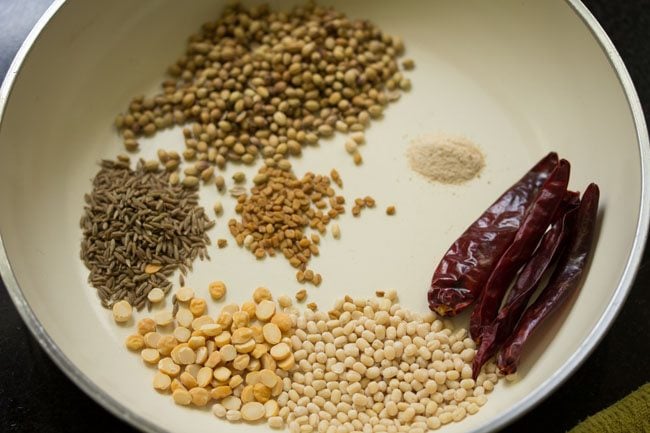
2. Dry roast only the spices mentioned above for the sambar powder on low heat till they become fragrant. Stir often so that the spices roast evenly.
Transfer the roasted spices to a plate and set aside.
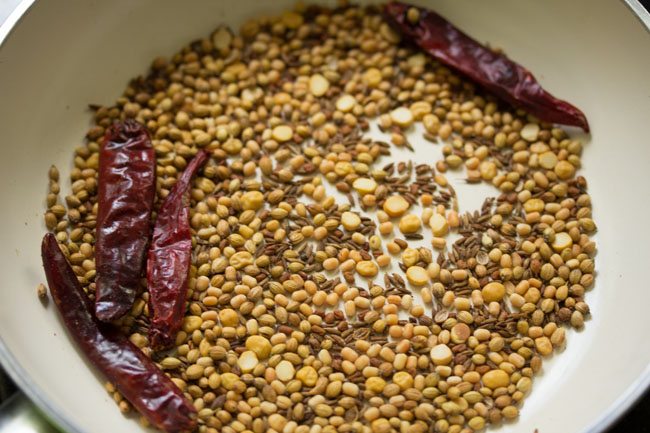
3. When cooled, add the roasted spices in a grinder jar, together with ⅓ cup water (or as required) and ¼ cup grated fresh coconut. Grind to a fine paste. You can also use desiccated coconut instead of fresh coconut.
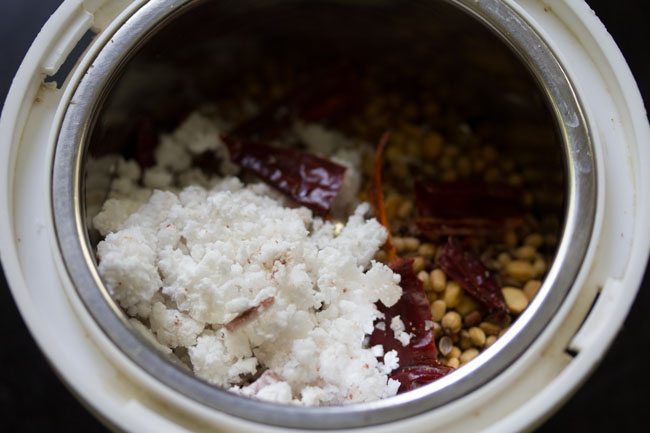
4. This is how the paste will look like.
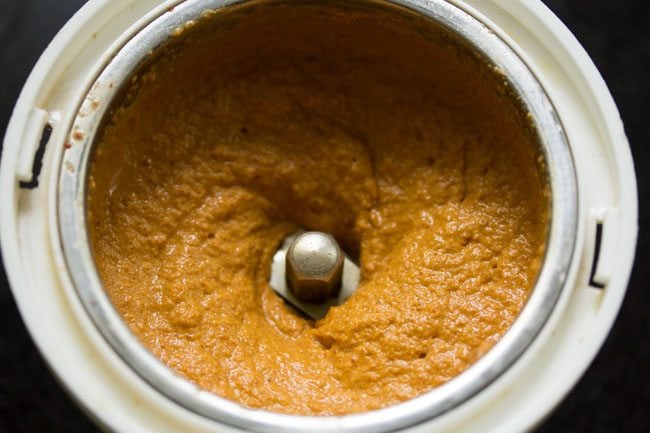
Cook Lentils and More Prep
5. In a 2 litre pressure cooker, add ⅓ cup tur/arhar dal (pigeon pea lentils) and ¼ teaspoon turmeric powder.
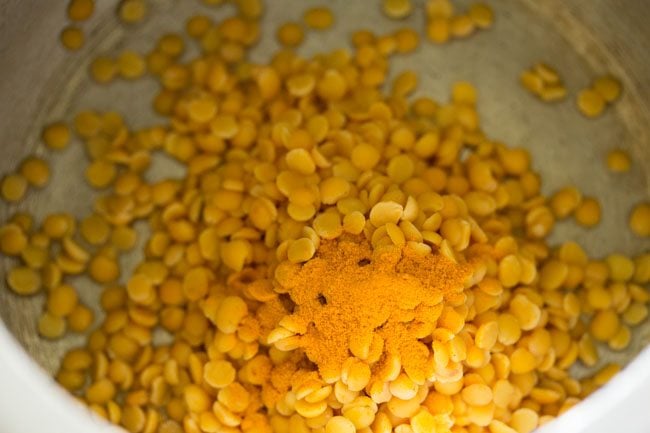
6. Add 2 cups water and pressure cook the dal for 7 to 8 whistles on medium heat or till the dal is well cooked, softened and mushy.
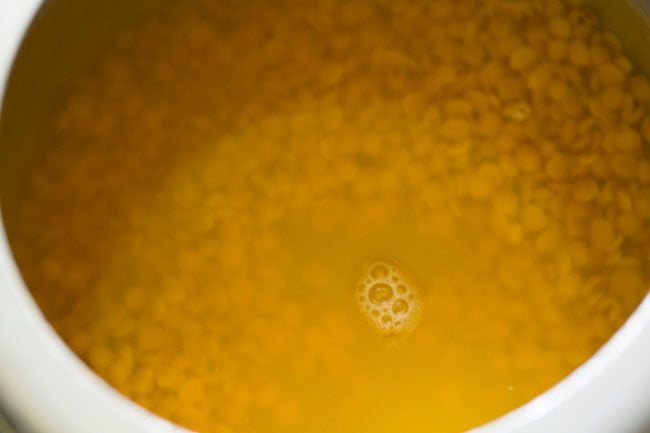
7. While the dal is cooking, soak 1 tablespoon tightly packed tamarind in ⅓ cup hot water for about 20 to 30 minutes.
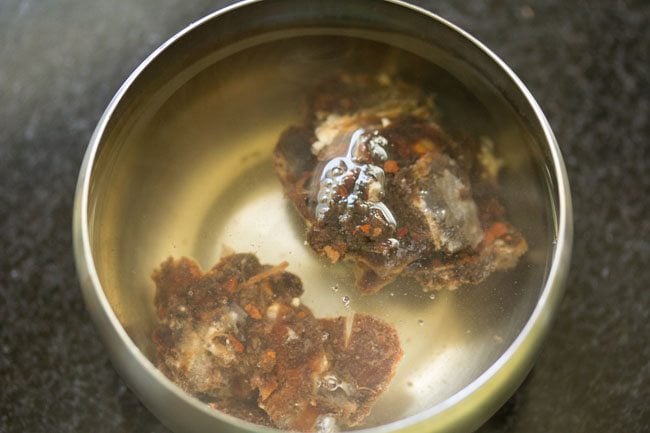
8. Once the pressure settles down naturally in the cooker, then remove the lid.
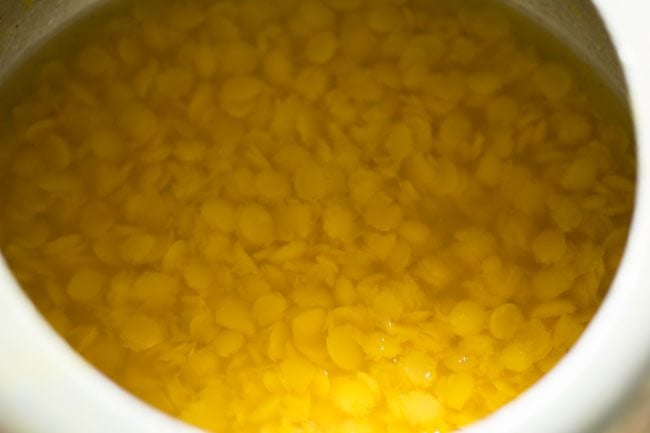
10. Mash the dal with a wired whisk or a spoon. Keep aside.
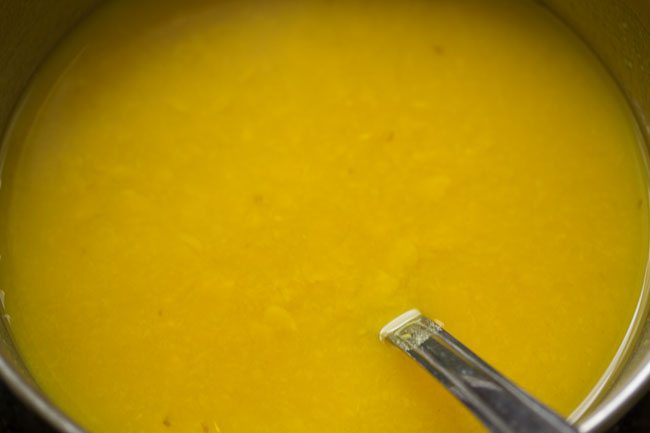
Cook Vegetables
11. In another pan or pot, mix 5 to 6 quartered sambar onions (pearl onions), 1 chopped carrot, ½ cup chopped bottle gourd, 2 to 3 quartered small brinjals, 1 to 2 drumsticks peeled and cut into 3 to 4 inch pieces, 8 to 10 curry leaves and 1 medium size diced tomato. Also add ¼ teaspoon turmeric powder.
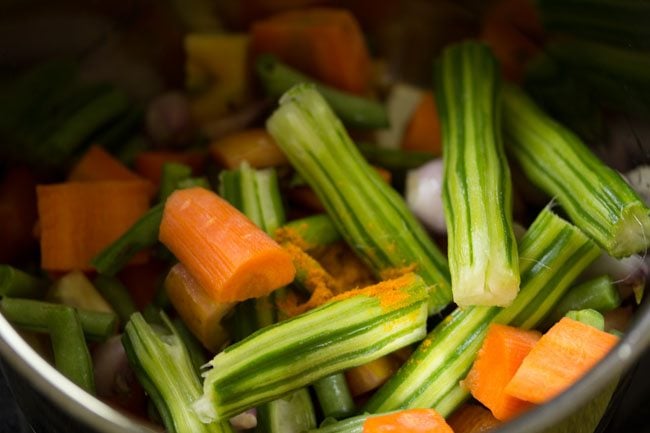
12. Next, add 2 cups water.
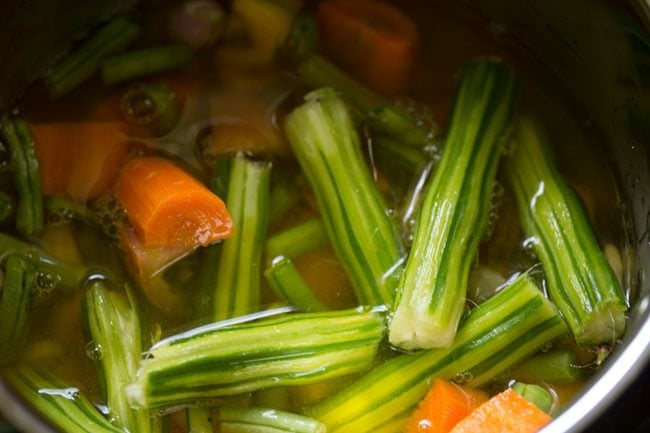
13. Cover the pan.
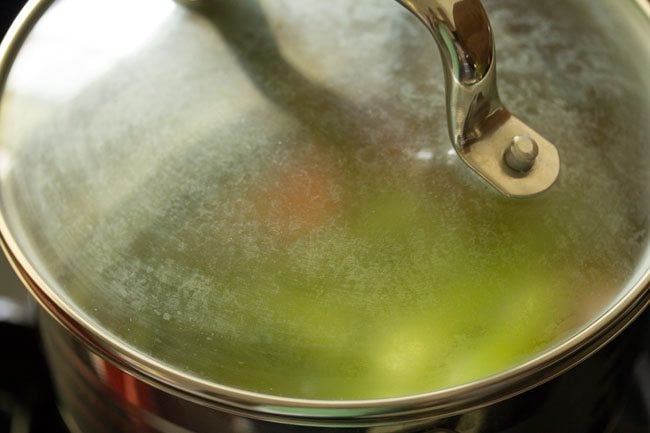
14. Cook till the vegetables are almost done on medium-low to medium heat.
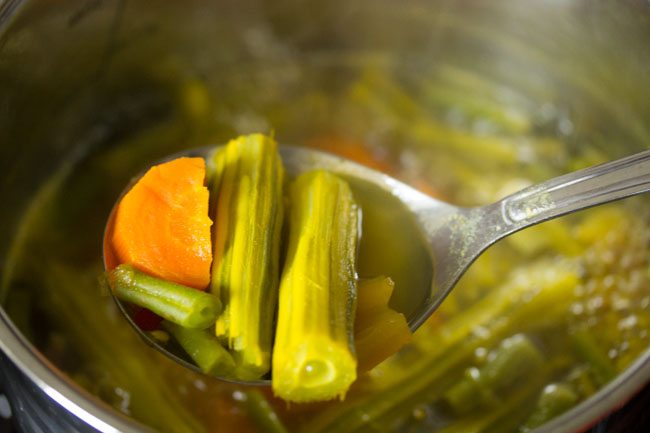
Make Udupi Sambar
15. Add the mashed dal to the vegetables.
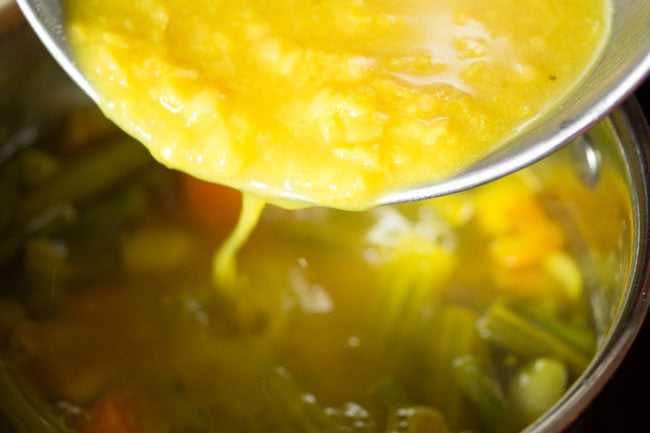
16. Stir and mix well.
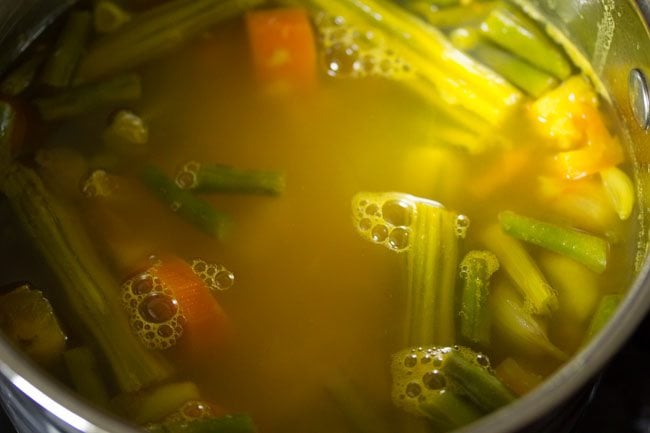
17. Squeeze the soaked tamarind with your fingers in the soaked water and extract the pulp.
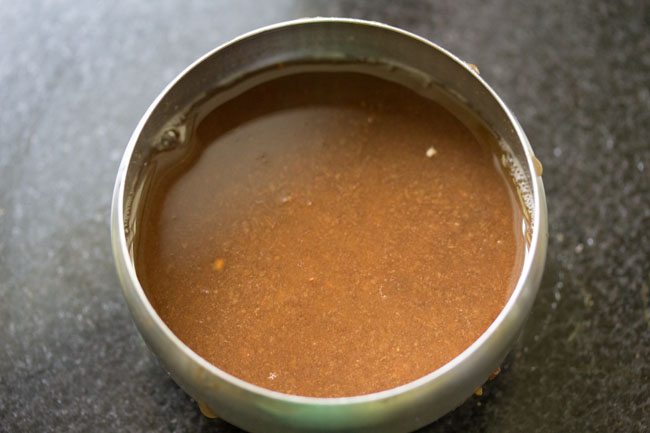
18. Stir and add the tamarind pulp. You can also use a mesh strainer to strain the pulp.
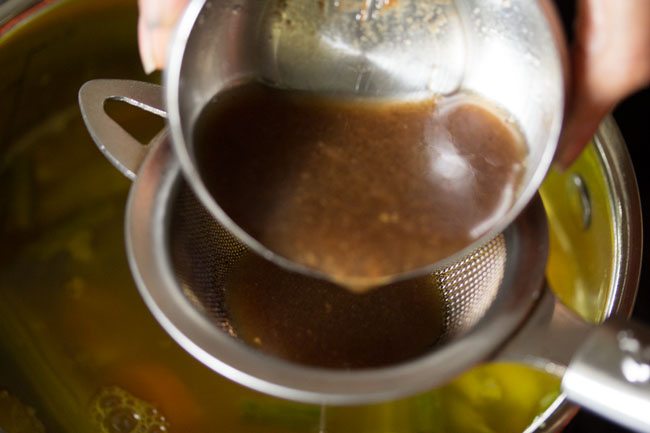
19. Now, add the prepared ground sambar masala paste.
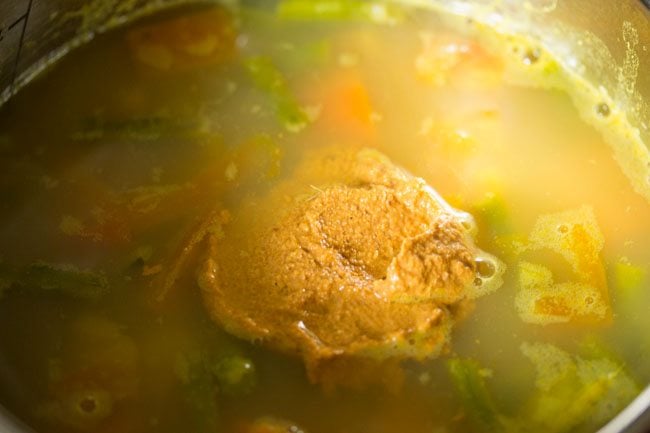
20. If required, you can add some water to get desired consistency. I added ¼ cup water. Also add salt as required.
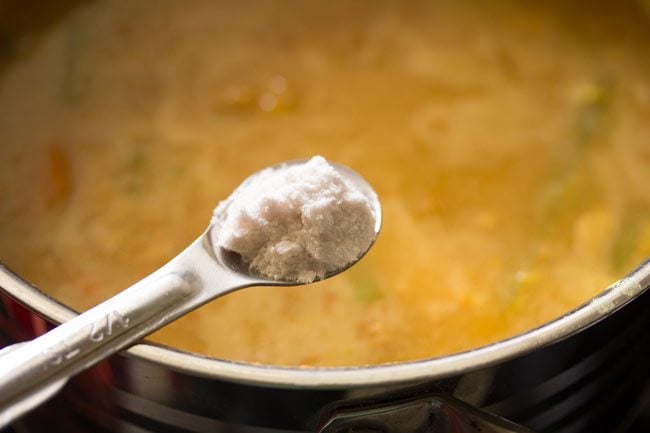
21. Add 1 to 2 teaspoons jaggery powder or grated jaggery.
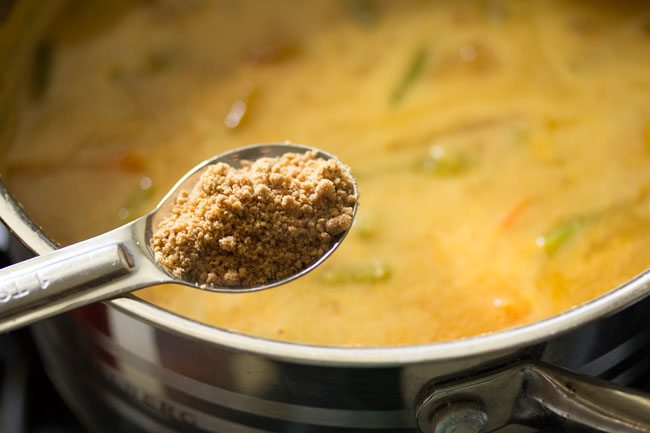
22. Stir and mix well.
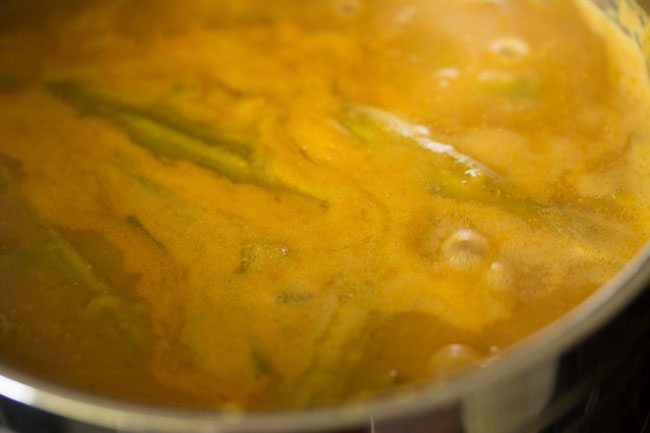
23. Simmer for 10 to 12 minutes or more. You have to simmer till the raw aroma of the tamarind goes away and flavors have merged with each other in the sambar. Check the taste and if required, add more salt.
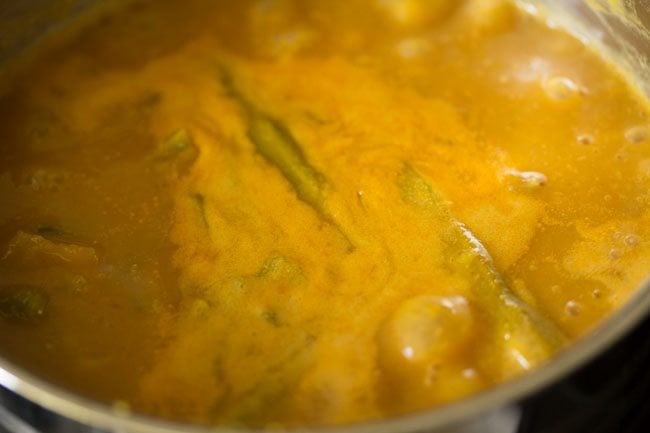
Make Tempering
24. Heat 2 tablespoons oil in a small pan. Splutter 1 teaspoon mustard seeds.
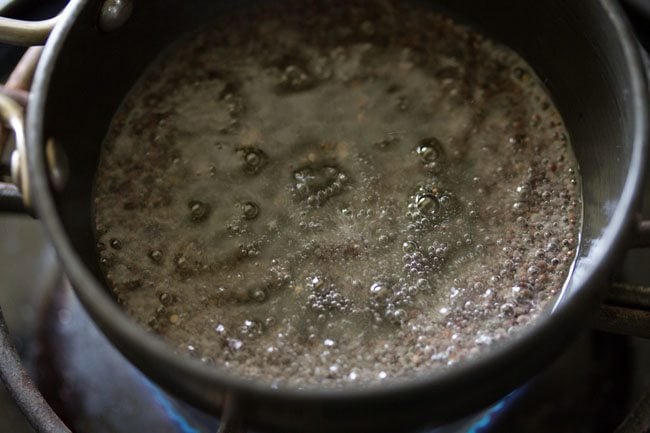
25. When the mustard seeds crackle, add 2 dried red chilies (broken and seeds removed), 8 to 10 curry leaves and 1 generous pinch of asafoetida (hing).
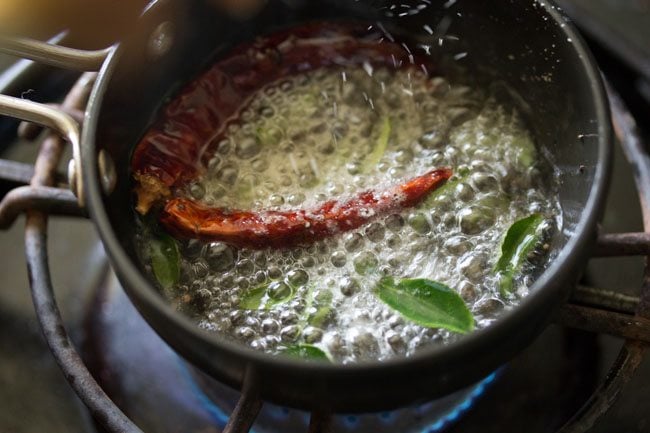
26. Fry for some seconds till the curry leaves become crisp and the red chilies darken. Make sure that the spices do not burn.
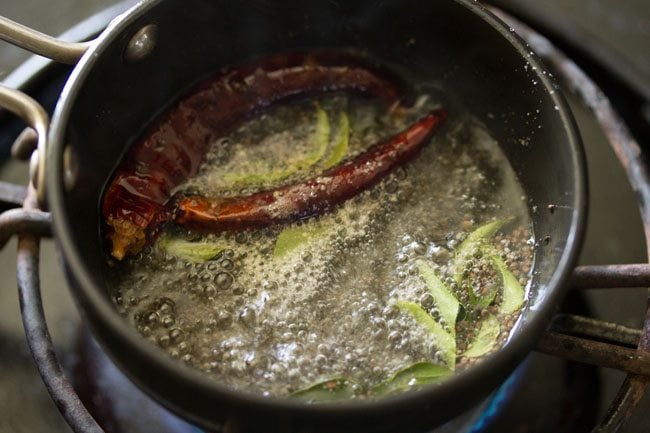
27. Pour the tempering mixture in the Udupi Sambar.
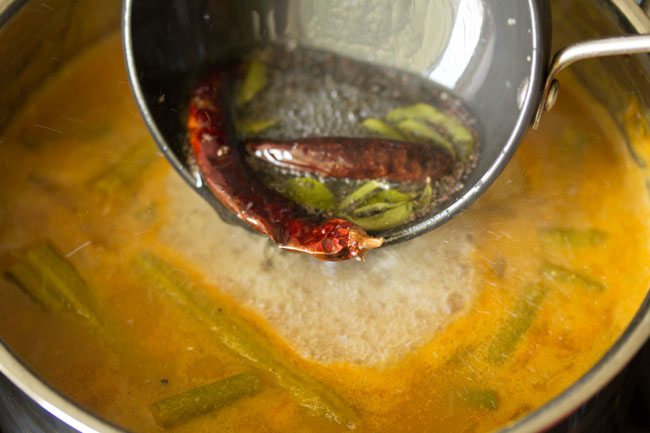
28. Stir and mix well.
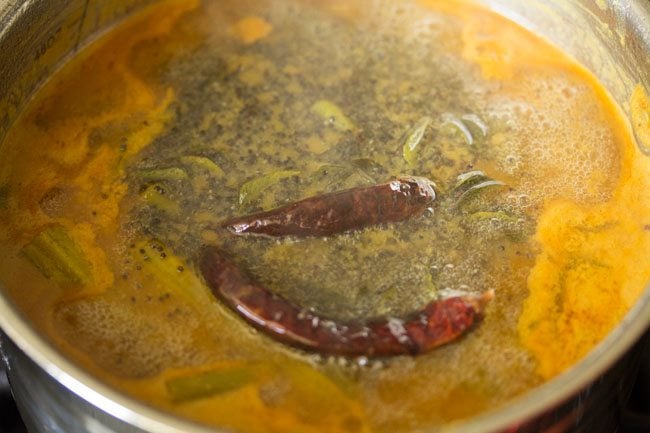
29. Cover the pan with a lid for a few minutes, so that the flavors of the tempering get mixed in the udupi sambar.
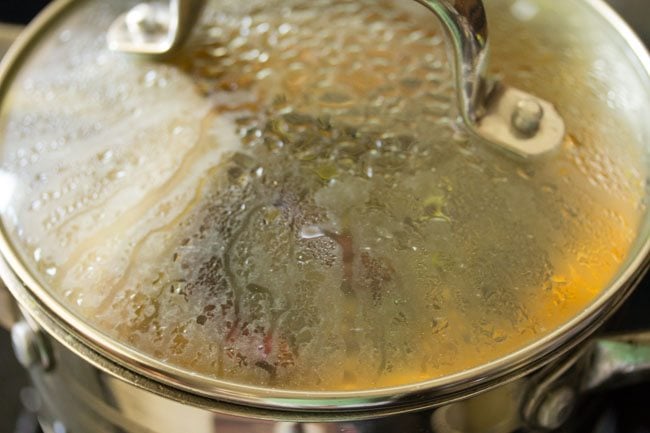
30. Serve Udupi Sambar hot with steamed rice, idli or dosa.
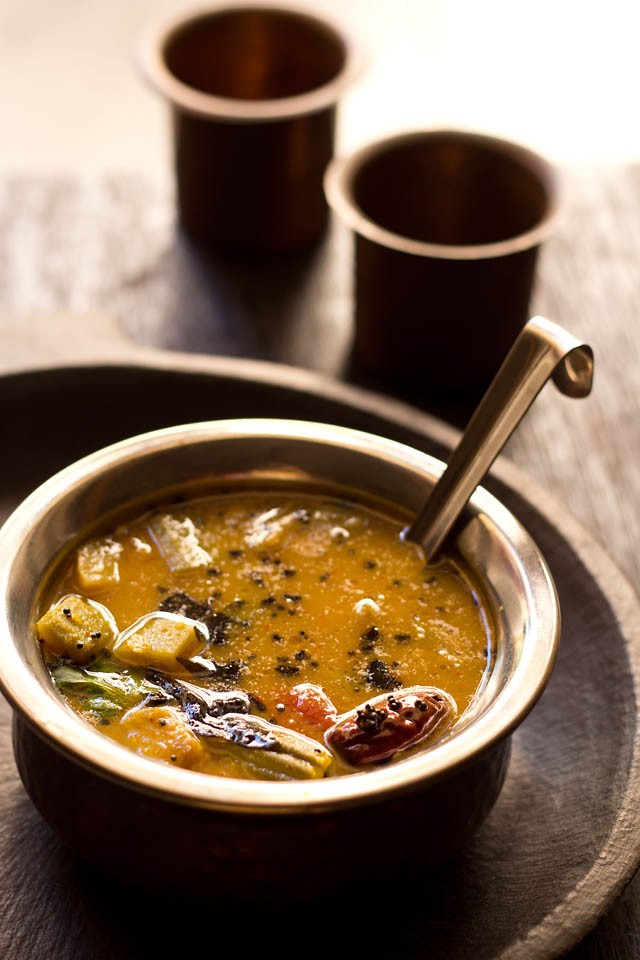
About Udupi Cuisine
Udupi Sambar is a famous dish from the temple town of Udupi, also a city located in the Tulunadu region of southwest coast of India. Udupi cuisine is an integral part of the Tuluva-Mangalorean food repertoire as well.
One of the most significant features of Udupi cuisine is that it is purely vegetarian, comprising of a wide range of dishes principally made with vegetables, fruits, beans and grains. It is also known to use native ingredients, which is a hallmark of this particular cuisine.
Given the satvik nature of Udupi food, an Udupi restaurant in South India would equal to a ‘Vaishno’ restaurant or dhaba (roadside eatery) in North India. Basically, meaning that both these would strictly serve vegetarian food.
The Udupi Sambar is a must in all Udupi homes, just like its best friend, Masala Dosa which is also believed to have originated in Udupi.
Here’s a post on Udupi Cuisine that I had read about a decade ago. It still holds important to me as the content in it is very interesting and endearing. Do give this a read to know more on this extensive cuisine.
More Sambar Varieties To Try!
South Indian Food Recipes
South Indian Food Recipes
Tamil Nadu Food
Tamil Nadu Food
Please be sure to rate the recipe in the recipe card or leave a comment below if you have made it. For more vegetarian inspirations, Sign Up for my emails or follow me on Instagram, Youtube, Facebook, Pinterest or Twitter.
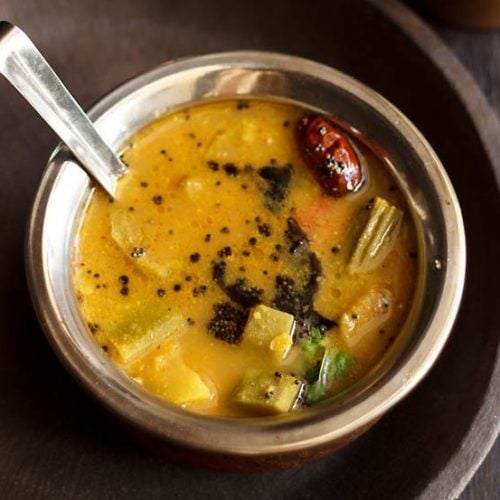
Udupi Sambar Recipe
Ingredients
Main ingredients
- ⅓ cup pigeon pea lentils (tur dal or arhar dal)
- 2 cups water for pressure cooking dal
- 5 to 6 shallots (sambar onions) or 1 medium-sized onion – quartered, optional
- 1 carrot – peeled and chopped
- ½ cup chopped bottle gourd (lauki or opo squash)
- 2 to 3 small brinjals (eggplant or aubergine), quartered
- 1 or 2 drumsticks – peeled and cut into 3 or 4 inch pieces
- 1 tomato – medium-sized, diced
- 8 to 10 curry leaves
- 1 tablespoon tamarind – tightly packed, soaked in ⅓ cup hot water
- ½ teaspoon turmeric powder
- 1 or 2 teaspoons jaggery or as add as required
- 2 cups water for cooking vegetables
- salt as required
For udupi sambar masala
- 3 teaspoons coriander seeds
- 2 teaspoons urad dal (husked and split black gram)
- 1 teaspoon cumin seeds
- 1 teaspoon chana dal (husked and split Bengal gram)
- ¼ teaspoon fenugreek seeds
- ⅛ teaspoon asafoetida (hing)
- 3 to 4 dried Byadagi red chilies or Kashmiri red chilies, broken and seeds removed
- ¼ cup grated fresh coconut or unsweetened desiccated coconut
- ⅓ cup water for grinding or add as required
For tempering
- 1 teaspoon mustard seeds
- 2 dried red chilies – broken and seeds removed
- 1 generous pinch asafoetida (hing)
- 8 to 10 curry leaves
- 2 tablespoons oil – any neutral flavored oil or can use coconut oil
- 1 to 2 tablespoons chopped coriander leaves – for garnish, (optional)
Instructions
Making Udupi sambar masala
- In a frying pan or skillet, dry roast only the spices mentioned under "for udupi sambar masala". Stir often while roasting/toasting them and ensure that they do not get burnt.
- When cooled, grind to a fine paste with ⅓ cup water together with grated coconut.
Cooking Lentils and Vegetables
- Pressure cook tur dal on medium to medium-high heat with 2 cups water and turmeric powder for 7 to 8 whistles on medium heat in a 2 litre pressure cooker
- Let the pressure fall naturally in the cooker and then only open the lid.
- When the lentils are cooked and softened, mash them with a wired whisk or a spoon. Set aside.
- Soak tamarind in hot water and set aside for 20 to 30 minutes. Later extract the pulp from the soaked tamarind. Set the tamarind pulp aside.
- In another pot or pan, mix the chopped vegetables, 2 cups water, turmeric powder, salt and cook till the vegetables are almost done.
Making Udupi Sambar
- Add the mashed lentils to the vegetables.
- Stir and add the tamarind pulp followed by the prepared sambar masala paste. If required you can add some water.
- Add the jaggery and mix again.
- Simmer for 10 to 12 minutes or more, till the raw aroma of the tamarind goes away and the flavors have merged with each other in the sambar.
- Taste and if required add salt.
Making tempering
- Firstly, heat oil and splutter the mustard seeds. Keep the heat to low.
- Then, add the red chilies, curry leaves and asafoetida.
- Fry for some seconds until the red chilies change color and the curry leaves become crisp. Pour the tempering mixture in the sambar.
- Cover the pan with a lid for a few minutes, so that the flavors of the tempering get mixed in the Sambar.
- Serve Udupi Sambar hot with steamed rice, idli or dosa.
Notes
- For the lentils, feel free to use moong lentils or a mix of tur and moong dal. You can also make the udupi sambar with an equal mix of tur dal and masoor dal.
- Choose to add vegetables that you have in your pantry or the veggies that are usually added in a sambar. Keep in mind the cooking time of the veggies and add them accordingly while cooking.
- You can also steam the veggies in a steamer pan instead of cooking them in water.
- Adjust the consistency of the sambar as needed by adding less or more water.
Nutrition Info (Approximate Values)
This Udupi Sambar post from the archives first published in May 2013 has been republished and updated on 3 May 2022.
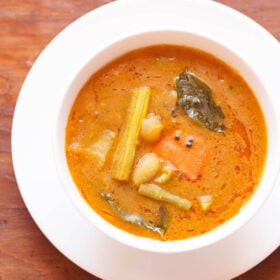
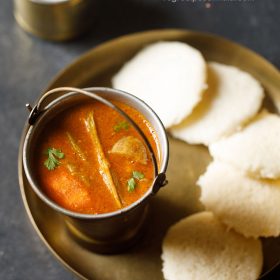
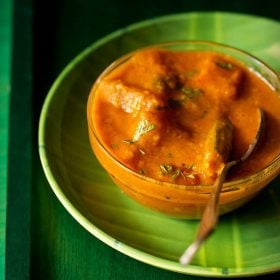
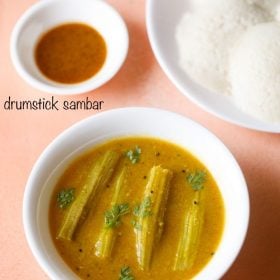
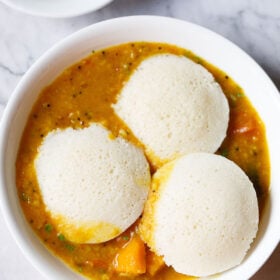
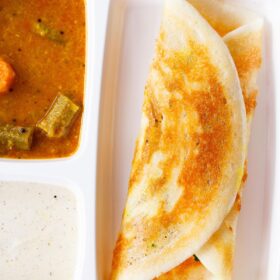
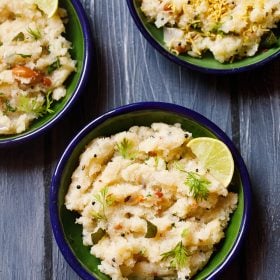








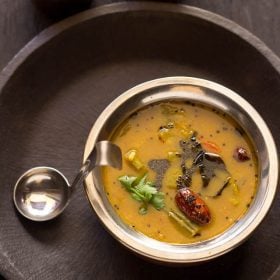
Hi Dassana,
Could you please tell if it 3 tsp coriander seeds or three tablespoons, as in the picture the quantity appeared less..
Thank you..
its 3 teaspoons coriander seeds. thank you for letting me know. its a typo error on my part. so you can use 3 teaspoons or 1 tablespoon of coriander seeds.
Can you tell me in grams measure of tuvar dal and sambar onions. Also what kind of dry chillies you used in your recipe. I just finished cooking tomato sambar of yours. Very very tasty.Thanks for the recipe of tomato sambar.Next time I want to try udupi sambar.
barb, half cup tuvar dal is 95 grams. sambar onions in weight is about 35 to 40 grams. you can add more sambar onions if you want. here i have used stick chilies. they are medium spicy. for this recipe, i would suggest to use byadagi chilies. you can use 4 to 5 byadagi chilies. also thanks for the feedback on tomato sambar. nice to know ?
Hi,
When do you add sambar onion
the sambar onion is cooked with the remaining veggies.
OMG! I just made the best Sambar ever. Thanks a lot Dassana and Amit.
Welcome Jo. thanks for sharing positive feedback.
It was awesome dasanna, superb with rice and ghee thank you for this.
welcome ramesh.
Awesome. It’s very tasty. My husband likes most. Thanks
welcome sejal
Hi Dassana,
All your recipes are very good. One key ingredient in the udupi sambar is 1 tbsp saunf to be ground with the sambar masala. I had a hotelier friend who had told me this.
Cheers
VV
hi vasanthi, thanks for sharing this info. i never knew saunf could be added to sambar masala. will try adding saunf and see the results.
Awwwwwesome. Its very tasty.
thanks shalini
Your recipe was too good. Taste was same as UDIPI restaurant. Ma’am just one confusion was there, when to add Jaggery. I added it after tamarind.
Thank you.
thanks. what you did was right. the jaggery is added after the tamarind is added. jaggery can also be added towards the end once the tamarind has got cooked. i will update the post.
Hey, it tasted yummy, thanks, must say u are a great cook.
I have a request can u post recipe for pickle of lemon in which we first ground lemon in mixer.
thanks khushboo. i am not sure about the grinding part, but we do squeeze lemon juice in the lemons while making pickles. i shall update in some time.
Hi, I have made many recipes from you blog and they have all been fabulous. However, I request your advice regarding Udipi Sambar. The dish turned out VERY unpleasantly acidic. I have not worked much with tamarind paste and am wondering if that is the culprit. My ingredients were purchased at the local India Grocery store (fresh curry leaves, fresh drumsticks, etc.) Perhaps I should have cooked the tamarind more? Any thoughts about how to ensure balance in this dish would be appreciated.
firstly thanks. secondly about the sambar…. i am sorry to hear this. as per what you mention “VERY unpleasantly acidic”, i think the sambar became too much sour to taste. i also feel tha tamarind was not cooked enough. the balance got awry here. since you have mentioned tamarind paste, i assume it would be store brought. tamarind paste is a thick concentrate and just 1 or 2 tsp would be enough for this recipe. i am giving you an approx proportion, since i have also not used tamarind paste more and the quality differs from brand to brand.
what i use is dried tamarind which is easily available in india. this dried tamarind is soaked in water and then squeezed to get the pulp. so its not a concentrated form like tamarind paste. for making any recipe that use tamarind, i would suggest to go with smaller amounts like adding 1/2 tsp of the paste and then keep on adding more and checking the taste till you get the desired sourness and balance in the dish.
a little extra sourness can be balanced by adding spice powders or salt or some extra water. even sugar or jaggery would reduce the sourness to some extent. but if its too much as i feel when you made the sambar, then not much can be done.
if you cook the tamarind well, the raw acidic taste goes away, but the sourness will remain if too much of the paste or pulp is added. i hope the tamarind paste was good and not spoiled. did you taste it before adding to the sambar.
hope next time when you make any dish with tamarind paste, it really comes out great.
Dasanna,namaskara,hope you are keeping fine and bussy trying new dishes,please dasanna send me recipes for baingan ki sabji and bhendi masala,thanks and regards.
i have some bhindi recipes including bhindi masala and some with baingan on the blog already posted. you can search with the recipe name in the google search bar located on the top right side.
gr8 one 🙂 dipping the idly in the sambhar must be tasty !
could be…
Deliciously comforting!
The sambar served in restaurants also always have this sweet taste and I’ve always loved it though I’ve never made it at home.This looks delicious!